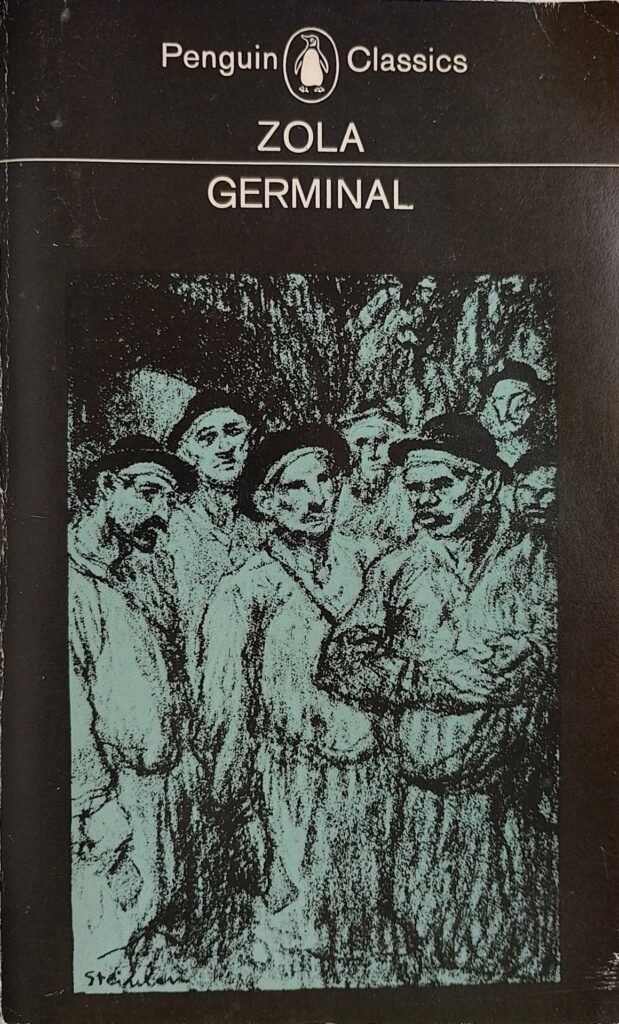First published 1885. Penguin paperback, 1977, translated by Leonard Tancock, pp 499, c.175,000 words (main text).
Hell is an appropriate description for the working condition of miners in late nineteenth century France – toiling deep underground with little light, dust, damp, too hot or too cold, the ever-present risk of explosion, flood, or roof collapse. Piecework pushed the miners on, causing them to skimp on ‘timbering’ – propping up the roof. Women, children and horses worked underground too. Zola does a magnificent job at evoking this world. Believably, Wikipedia tells us that he did extensive research, including going down a mine and talking with miners. It feels real.
The protagonist is Étienne Lantier, an out of work mechanic, who, in desperation, takes a job as a miner. It is through his eyes that we experience the mine. He is befriended by the leader of a mining team, and his family, one of whom, Catherine, aged fifteen, he mistakes for a boy in the dark as she is dressed like the men. Her younger brother, aged eleven also works in the mine. The whole family, parents, grandfather and seven children occupy a very basic mine-owned house with only three rooms.
After the first sixty pages, the scene very suddenly changes to the house of the bourgeois Grégoire family, who have one much-loved daughter. The contrast with the earlier scenes is shocking. Here it speaks of well-fed comfort and leisure. Only the servants work. So is this book just a political polemic? To some extent, of course it is. But Zola is too acute an observer to reduce the world to the nobility of labour versus the iniquity of capital. The working people are far from paragons, and quickly turn on one another. Included here is a nice little story of two workers who win a lottery and immediately give up work and buy themselves the bourgeois lifestyle. The bourgeois have their misfortunes too, and often have obtained their position through sheer luck. Even the indolent Grégoires are rich because an ancestor, a coachman, was persuaded by his employer to use some of his savings to invest in a mining venture.
The book marches through the stations of the cross that one expects from a story centred around mining. The mines are under severe pressure from a down-turn in the economy. There are terrible accidents, a strike, mob-riots, starvation and all the rest. A couple of particularly moving scenes concern the mine’s horses – dumb beasts. Symbolic, of course.
Stirring up the community are the outsiders, political agitators, some of whom relish only destruction. Another is a professional orator who does no hard labour himself. Étienne gets drawn into a leadership position, but soon realises that he is unable to control the forces he has unleashed.
The telling has its elements of melodrama. The central characters are together in the most dramatic scenes. But this is forgivable for the story, and indeed the political points Zola is making. What ultimately matters is the depiction of the really messy, complicated, and cussed human world. The good don’t always prevail, the bad don’t always get punished. The good aren’t solely good – there are no saints here, and the bad aren’t solely bad – the rich have their demons too. The underserving sometimes advance and the deserving are knocked down. Reality.
This translation, now at least seventy years old, stands up well. In the introduction, Tancock explains that one of the difficulties is that French gives most names genders, and this creates problems for translators into English when only the surname is given for a character. When the name is gendered in French he has left out the article: Maheude is the wife of Maheu, for example. But when the name is not gendered he includes the French article: La Levaque is the wife of Levaque. I would have found it easier had he given all the female names articles (La Maheude). No choice in this regard is perfect. Interestingly, all the temperatures given are translated into Fahrenheit. Fortunately Zola’s originals, given in Centigrade are also included as footnotes.
Tancock also explains that this book was one of a series of twenty that Zola wrote about a single family over many generations, intending to show inherited characteristics. That is almost irrelevant to the reading of this book. Ultimately the series was a criticism of the second empire. However, that had been swept away after the defeat of the French in the Franco-Prussian war, before this book was written. The translator also says that many of the worst excesses of the mining industry depicted here had been removed by the time it was written, and that therefore it should not be considered historically accurate of the conditions prevailing at the time it was written.
Zola pulls no punches when describing the mining communities. Given the awfulness of the working and living conditions of the miners and their families, it was little wonder that all they had left for reward were drinking and sex. Language was vulgar. With no protection, girl’s became pregnant as soon as they physically could; raped if not desired. Few miners made it to sixty, and none in good health if they had spent fifty years underground. Everyday was a struggle to make ends meet, the food poor and inadequate.
Zola is an outstanding writer, bringing to life his characters and setting. While sometimes he may exaggerate, he has real feeling for the horrors he is describing – wanting to bring them home to his readers. He was a real master of describing crowds. Zola may have been a man of the left, but he recognised a common humanity, with good and bad mixed in all of us.
Wikipedia biography of Zola: https://en.wikipedia.org/wiki/%C3%89mile_Zola
Wikipedia summary of the book: https://en.wikipedia.org/wiki/Germinal_(novel)
Others’ reviews of the book: https://www.goodreads.com/book/show/28407.Germinal?ref=nav_sb_ss_1_8
© William John Graham, September 2024

